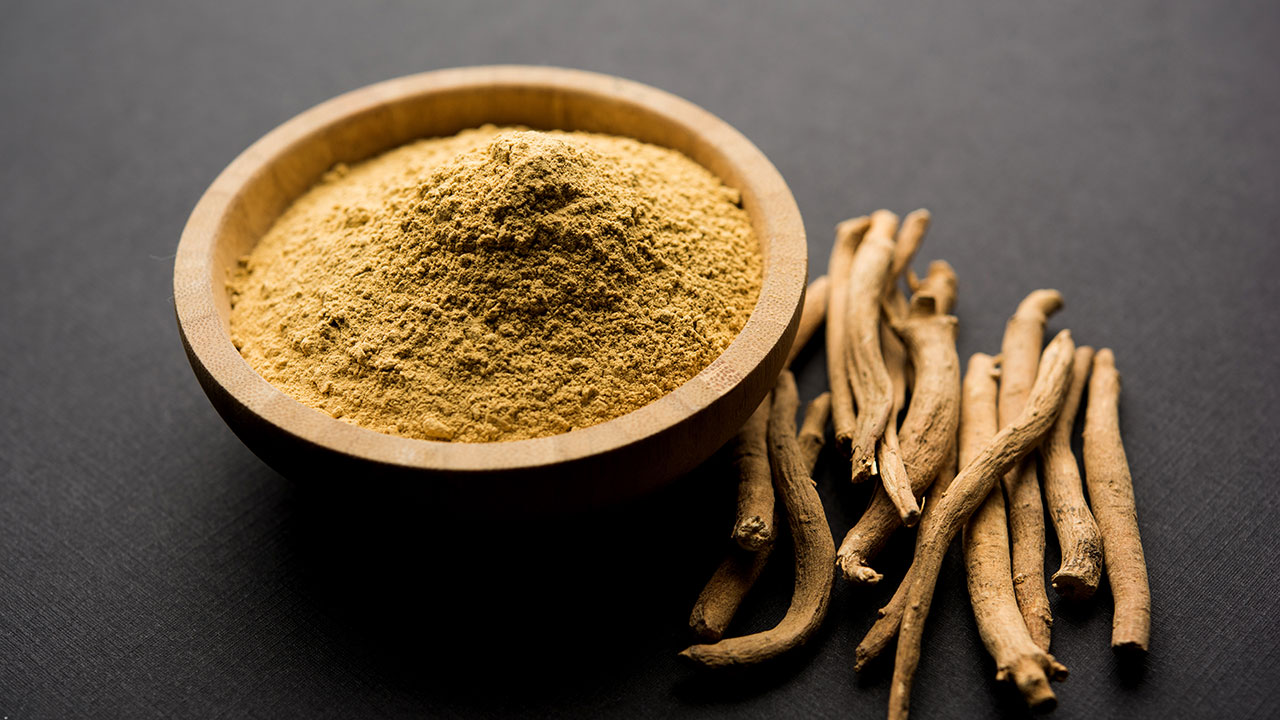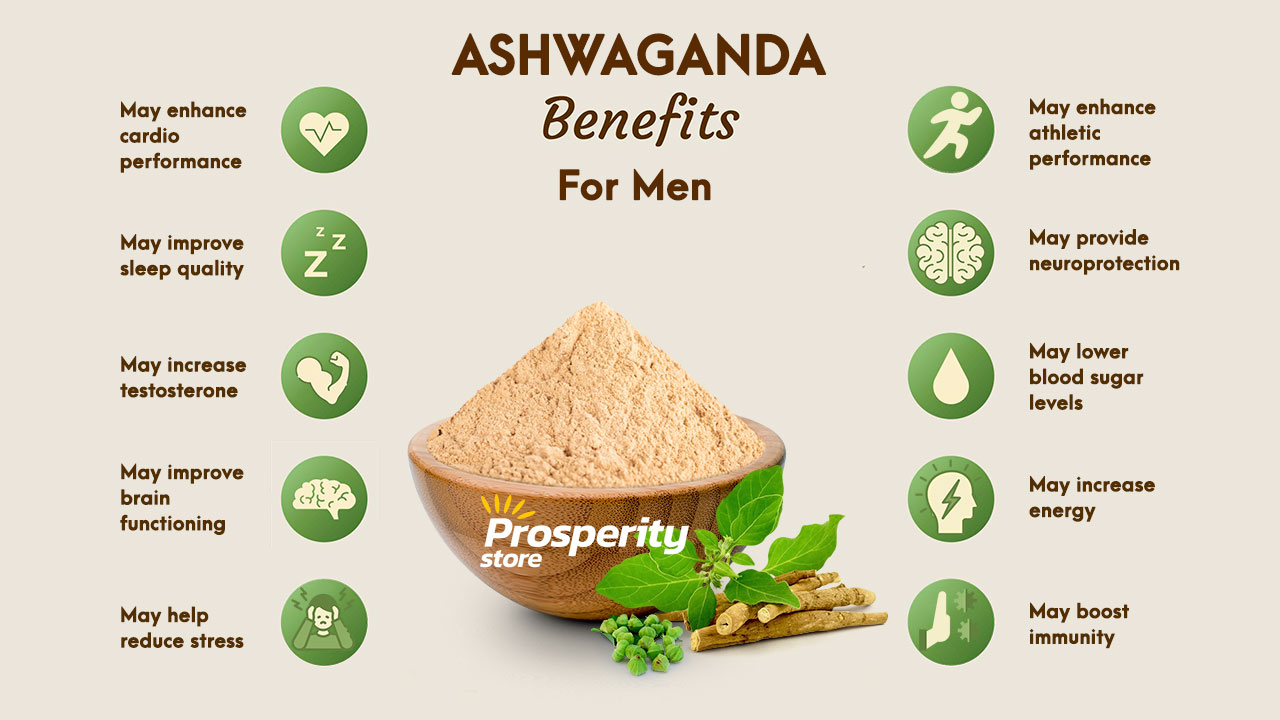Health Benefits of Ashwagandha for Men
Summarize

If you are delving into natural products to enhance wellness and fitness, you will likely come across Ashwagandha, a herb that has been a staple in traditional Ayurveda medicine in India and Unani medicine in South Asia for thousands of years. It is gaining popularity as an herbal ingredient in various wellness products, including CBD oil, gummies, and capsules, to amplify its effects. Many of these products are tailored for men, given the long history of men reporting positive effects on physical strength and mental well-being from ashwagandha. The ashwagandha benefits for men are mainly attributed to the adaptogens found in the leaves and roots of a shrub.
What is Ashwagandha?
Ashwagandha, also known as Indian ginseng and winter cherry, is a natural herb that grows as a small evergreen shrub in parts of India, the Middle East, and Africa. Its scientific name is Withania somnifera, and its Sanskrit name translates to ‘the smell of a horse’ because of how the root smells in nature. It is traditionally recognized for its ability to provide strength and vitality, and numerous clinical studies are now confirming these traditional beliefs, providing a solid scientific foundation for its benefits.

Ashwagandha, a small evergreen shrub native to parts of India, the Middle East, and Africa, is a treasure trove of bioactive compounds. Its leaves contain alkaloids, free amino acids, glucose, flavonoids, tannins and 12 withanolides. The roots, however, house alkaloids, amino acids, volatile oil, glycosides, withaniol and more. These withanolides and phenolic compounds, like flavonoids, are believed to be the key to ashwagandha’s health benefits, providing a deeper understanding of why this herb is so beneficial.
Adaptogens, such as ashwagandha, ginseng, and Rhodiola, are plant-based compounds that may help protect your body from external stress impacts. These adaptogens, consumed in teas, foods, drinks, and herbal supplements, are also added to other health-focused items like lotions and balms. The ashwagandha roots, leaves, or root-leaf extracts are often ground into a powder; sometimes, the Ashwagandha berries are also used. Most research to date has focused on the Ashwagandha root, highlighting its potent adaptogenic properties.
How Do Adaptogens Work in the Body?
Researchers have found adaptogens help the body remain stable when something negatively affects system balance. As an adaptogen, Ashwagandha is believed to help the body adapt to stress through several actions. The Withania somnifera plant contains withanolides A, a naturally occurring steroid. The withanolides (specifically withaferin) in Withania somnifera plants have been researched for their diverse biological activities, including anti-stress, immune system modulation and antioxidant effects. As you will read, ashwagandha performs many functions, from reducing activity on the HPA axis to protecting cells.
Ashwagandha Benefits For Men
There are many effects of ashwagandha on males, which are supported by clinical research. Following are some of the ways this remarkable herb may improve male wellness.
Note that physical and mental issues are related. For example, chronic stress increases cortisol, which affects mood and energy. Reducing stress improves mood and energy levels. The bottom line is that when you take ashwagandha for a specific benefit, you will experience multiple benefits of ashwagandha roots and leaves.

1. May Help Reduce Stress
Ashwagandha may significantly reduce stress due to its effects on the hypothalamus-pituitary-adrenal (HPA axis) glands. A study found ashwagandha reduced morning cortisol levels, anxiety, pulse rate and blood pressure in chronically stressed adults.
Cortisol is called the “stress hormone” because the level increases when feeling stressed. As a result, more glucose is generated and the heart rate increases. Ashwagandha is an effective adaptogen that has been shown to reduce serum cortisol levels and may improve your stress resistance.
2. May Improve Sleep Quality
Stress goes hand-in-hand with poor sleep quality and insomnia. The Sleep Foundation says that one-third to two-thirds of adults deal with periodic insomnia, which causes daytime mental impairment. Men who experience poor sleep also may experience lower testosterone levels.
3. May Increase Testosterone and Fertility
Ancient Ayurvedic texts indicated people found ashwagandha improved libido and fertility. Is it true that you can take ashwagandha for male fertility? Testosterone is a male hormone called androgen. Clinical placebo-controlled studies have found that ashwagandha does improve sexual well-being. One study reported that men 40-70 years old taking ashwagandha for eight weeks had a 14.7% greater increase in testosterone compared to the placebo group. There was also an 18% increase in DHEA-S, a steroid hormone produced mainly in the adrenal glands. DHEA-S is converted into androgens like testosterone in men.
In another study, Withania somnifera improved semen quality by reducing oxidative stress. It also increases serum testosterone and luteinizes and reduces the levels of hormones that may impede reproduction.
4. May Enhance Athletic Performance
A much-touted eight-week placebo-controlled clinical study of ashwagandha on muscle mass and strength in young men doing resistance training found significant improvement in muscle strength while bench-pressing and performing leg-extension exercises and also increased arms’ muscle size. Also important is a significant reduction in muscle damage commonly experienced while exercising. They took 300 mg of Ashwagandha root for eight weeks.
There was a 2021 study to evaluate all clinical trials up to 2020 concerning the effect of ashwagandha on physical performance. The researchers found that taking ashwagandha root extract positively affects muscle strength, muscle power, fatigue, recovery, cardio, and respiratory rate. They believe it may be due to the plant’s antioxidant properties.
5. May Enhance Cardio Performance
Many studies have focused on Ashwagandha’s effect on male athletic performance, but many of the benefits of a healthy athletics experience are just as beneficial to men who may not be athletes but are active at work or during personal time. A study found that men taking 500 mg of ashwagandha root twice daily for eight weeks experienced improved cardiorespiratory endurance.
Ashwagandha supplementation may improve Vo2max (maximum oxygen capacity), which is an indicator of aerobic capacity. A review of studies in this area was made in the interest of the potential of ashwagandha to improve cardiorespiratory fitness in older adults.
6. May Improve Brain Functioning
A recent study confirmed that people taking ashwagandha root extract with 2.5% withanolides once a day were found to have significant improvement in concentration, multitasking and decision time making.
7. May Provide Neuroprotection
Ashwagandha may also have a beneficial neuroprotective effect. This is believed to be due to its ability to increase GABA and decrease dopamine. Ashwagandha has been found to enhance GABAergic signaling, which promotes relaxation and reduces anxiety. GABA (gamma-aminobutyric acid) is an inhibitory neurotransmitter that helps calm the nervous system. Brain health is positively impacted through the prevention of excess levels of corticosterone. Withanolide, mentioned earlier, is considered Ashwagandha’s most crucial component for combating neurodegeneration. The many actions contribute to neuroprotection, like calming the brain, lowering blood sugar, enhancing the immune system, etc. However, the potential of ashwagandha to protect cells from oxidative stress is major.
8. May Lower Blood Sugar Levels
Much more research is needed because the studies to date have been small, but they show that ashwagandha may lower blood glucose and serum triglycerides. The project showed a significant decrease compared to the placebo group, which took 400 mg of ashwagandha daily for one month.
9. May Increase Energy
Ashwagandha has been considered an energy booster for thousands of years. Its potential ability to reduce inflammation and act as an antioxidant means you develop more robust, healthier cells.
Safety and Side Effects of Ashwagandha
Ashwagandha has the potential to increase the effects of some medications. For example, if you take diabetes or blood pressure medicine, ashwagandha could lead to lowering blood sugar levels or blood pressure too low. If your thyroid is close to becoming hyperactive, ashwagandha has the potential to lead to hyperthyroidism by increasing thyroid hormone production. If you have an auto-immune disease, ashwagandha could improve the immune system’s activity, making your disease symptoms worse.
Before taking any supplement, you should always talk to your doctor first, especially if you are on any medication. Herbs can have powerful effects and can interact with medications in some manner. If you take the following medications, there is a chance Ashwagandha may interact with them.
- Immunosuppressants
- Sedatives, including benzodiazepines and CNS depressants
- Thyroid hormones
- Antidiabetics
- Blood pressure medications
Some of the potential side effects of ashwagandha include the following.
- Upset stomach
- Vomiting
- Diarrhea
Dosage Recommendations
The general dosing recommendations vary among doctors and researchers. You can start by taking at least 300 mg of ashwagandha once or twice daily. If you are using a powder, it can be mixed in food or drink. One doctor says the typical dosing is 500 mg twice daily.
If you start with 300 mg per dose, you can make sure there are no side effects, like nausea or gastrointestinal upset, before increasing the dosage.
Research Ashwagandha Products
Before starting any product containing ashwagandha, whether a supplement or a product with ashwagandha added as an ingredient, talk to your doctor first. Each person is unique, and your safety is always a priority.
Everyone interested in researching herbal medicine agrees there should be more research conducted on ashwagandha. It is a powerful herb that may naturally convey so many benefits. There is a good reason it has been consumed for thousands of years as a “rejuvenator.”
Sources
- https://www.ncbi.nlm.nih.gov/pmc/articles/PMC10045402/
- https://www.sciencedirect.com/topics/chemistry/withanolide
- https://www.ncbi.nlm.nih.gov/pmc/articles/PMC6750292/
- https://www.ncbi.nlm.nih.gov/pmc/articles/PMC3573577/
- https://www.sleepfoundation.org/insomnia/stress-and-insomnia
- https://www.sleepfoundation.org/how-sleep-works/how-is-sleep-different-for-men-and-women
- https://www.ncbi.nlm.nih.gov/pmc/articles/PMC6438434/
- https://pubmed.ncbi.nlm.nih.gov/19501822/
- https://jissn.biomedcentral.com/articles/10.1186/s12970-015-0104-9
- https://www.ncbi.nlm.nih.gov/pmc/articles/PMC8006238/
- https://www.researchgate.net/publication/370838427_Benefits_of_Ashwagandha_supplementation_on_strength_and_endurance_exercise_a_narrative_review
- https://www.mdpi.com/2072-6643/12/4/1119
- https://www.ncbi.nlm.nih.gov/books/NBK83160/
- https://pubmed.ncbi.nlm.nih.gov/37832082/
- https://www.ncbi.nlm.nih.gov/pmc/articles/PMC10147008
- https://www.ncbi.nlm.nih.gov/pmc/articles/PMC10147008
- https://pubmed.ncbi.nlm.nih.gov/23125505/
- https://www.webmd.com/vitamins/ai/ingredientmono-953/ashwagandha
- https://healthmatters.nyp.org/what-is-ashwagandha/
- https://health.clevelandclinic.org/what-is-ashwagandha
Disclaimer: This article is for informational purposes only and is not intended to diagnose, treat, cure, or prevent any disease. Always consult a healthcare professional before changing your health or medication routine.
Share this post
